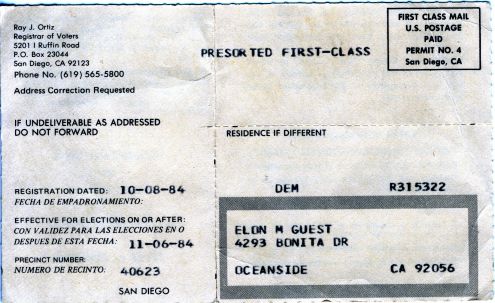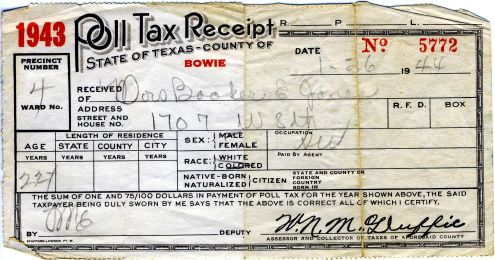About a week ago, on the Facebook website, someone posted an event entitled “Election Day.” Members were asked to choose whether they were “attending” or not, much like R.S.V.P.’ing for a dinner party. I selected Yes, and added a note: You would have to kill me to keep me from attending. I haven’t always felt this way.
The first time I voted in an election was in 1978. I remember little about it, except that the candidate I voted for, Jerry Brown, won the election as governor of California. Somewhere in my house there is a photograph of me standing outside the door to the First Presbyterian Church on El Camino Real in Oceanside. There is an American flag beside me, waving from a pole on the wall as a beacon to the community declaring, This is the place! It should have been an exciting moment, but I don’t think I was really aware of why it was important. In the photograph, I am tapping a piece of paper (possibly my voting cheat sheet) in the palm of one hand, with an impatient look on my face.
After that election, I had a long, discouraging streak of voting for losers. That is, candidates who did not win their races. During the 1980 presidential campaign, I joined forces with a sizable group of fellow college students and like-minded Cantabrigians and threw my support behind independent candidate John Anderson. There were Teas for Anderson, Study Periods for Anderson, and Runs for Anderson (I had a t-shirt from that event, until it fell apart from wear and washing). But Anderson’s 6.6 % of the popular vote didn’t win him the Presidency, nor did it give him even one state. That year, Ronald Reagan nabbed even “liberal” Massachusetts.
Mondale in 1984, Dukakis in ’88. It wasn’t until 1992 that my candidate won. But by then, and with no small amount of learning gained from my lost vote investments, I had figured out that casting a vote wasn’t necessarily about the win, or betting on the “horse” most-likely-to. I was fortunate to have grown up in a social and academic environment that encouraged me to research issues, rather than personalities, and make informed decisions that had the potential to benefit both me and my community in the short and long term. You don’t always win, but you make your best reasoned choices, just as in daily life. That’s the general prism through which I’ve attempted to view my annual voting decisions.
There was a period since 1978 – while living in Cambridge – during which I neglected my voting right when it came to local elections. I had no idea who the mayor and city councilmen were and, as I was probably moving on from there before long anyway, didn’t give them much thought. Since moving to the South in the late ’80s, I’ve grown to believe that it is the local elections that have the most immediate impact on my life. The string of ineffectual and corrupt elected public officials in my current city and county have only strengthened my resolve to support the few individuals with some vision who are willing to bare their lives to public scrutiny. Birmingham, like many communities, is unkind to its public servants. Sometimes, it is easy to feel that a well-informed vote is powerless against a wave of votes that are motivated by a boundless series of -isms. But, I feel, you still have to vote.
So, where was I going with this? Why do I vote? Well, I am starting to view it as a gift. Not as a gift from the government, mind you, but a greater, yet subtler, gift. A gift that I just discovered.
Over the past weekend, I opened a box that had made its way to me on a moving van from my mother’s house in California. Several years ago, this van was going to South Carolina, Mom’s new home, and she had packed a few things to be delivered to my house en route. This particular box contained a mixture of items that had belonged to my grandmother, Mom’s mother. Among them was a blue bank pouch containing many of her vital documents, including birth and death certificates, marriage certificates, and the like. As I read through them, I pulled out a postcard, dated 1984.

I was struck quite profoundly that a woman in her ninth decade, and not necessarily in the very best health, was still making a point of voting. Granted, there is a little more free time for a person at an advanced retirement age, when the activities of daily living tend to be the focal events of each day. Even so, it seemed to me that the preservation of this voter registration card, issued just a couple of years before her death, meant more to this woman than just a trudge to the firehouse once a year. I was also struck by the DEM printed above her address. I don’t recall ever having a political discussion with her, and was enlightened to find out her political party affiliation – nearly a quarter of a century after the printing of the card. This could mean that in her lifetime she might have voted for FDR, Adlai Stevenson, or maybe even John F. Kennedy, and I was quite proud imagining my voting lineage.
Then, I found this.

This poll tax receipt was the 1944 equivalent of the “I Voted” sticker that we might wear on our lapel (or stick on our car’s dashboard), though it had to be earned. Just look at the wealth of information contained on this form. It cost a citizen $1.75 to vote in January of 1944, which would be at least $20.00 by 2007 economic standards. Forking over a twenty-dollar bill today would keep quite a lot of people from the polls, don’t you think? It was not until 1966 – in my lifetime – that this poll tax was ruled as unconstitutional in Texas. And the Voting Rights Act of 1965 rendered the racial distinction illustrated on this receipt antiquated (“white” vs. “colored”). Furthermore, the additional distinction by gender on this poll tax receipt is outdated, as the 19th Amendment gave women equal voting rights in 1920.
My grandmother was born in 1905 and lived until 1987. During her lifetime, she witnessed all of these changes in voting law. She, in fact, was eligible to vote in every presidential election that occurred as of the date she became of age to vote. If she had been born less than a decade earlier, that would not have been the case. It’s possible that she read about women gaining the right to vote in the newspaper, or had it read to her (she didn’t hear it on the radio, as the first radio news broadcast was in August of 1920). She probably watched the civil rights movement unfold on her television. She lived through all of this. All of this history. And, by the time she died, she no longer had to pay to vote.
Today, I am thinking about this march of history, where I fall in the timeline, and of the upcoming election. My right to vote has never been in question, and I feel that there are periods in my life when I have taken this freedom for granted. Nowadays, I am told by some that I deliberate too seriously about my vote. In this, they are 100% correct. I’ve been told that one vote doesn’t really matter in the grand scheme of things. One of my friends, an unconditionally conservative small-business owner who lives near me, has concluded that my vote has no value, as his vote will always cancel mine out. Are you kidding me? My vote is one of the most valuable things I own. If I failed to use it, I may as well be dead, as my Facebook comment suggested.
When I go to the poll next week, my vote will not just be a thoughtful and measured decision (by the political calendar, I’ve spent the better part of two years making it). My vote, that smudge of #2 pencil lead, will represent who I am, how I got here, and where I came from. My vote was earned by millions of people who lived before me who, like my grandmother, believed it to be something sacred, with immeasurable value. When I vote, I will be expressing pride in a hard-won tradition, given to me to decide how to use it. When I vote, I’ll be hoping that, years from now, my example might inspire someone else to carry it on with the same spirit.


6 responses so far ↓
1 Evelyn // Nov 1, 2008 at 12:38 PM
FO, This is a real winner!!! Well done and well said!
2 Cuz // Nov 2, 2008 at 10:24 PM
Huzzah for voting!!! Holding my breath til Tuesday night…M
3 Brentski // Nov 3, 2008 at 4:46 PM
Great piece, Fred O.
I’m amazed by the history, especially the poll tax your grandmother paid.
It’s easy to see how this would have achieved the effect of “disenfranchising poor and African-American voters” (Wikipedia).
4 ABE // Nov 4, 2008 at 12:18 PM
Loved this! Made me think about my own voting history, too!
5 spitballarmy // Nov 5, 2008 at 2:38 PM
Thanks for the comments.
It is truly amazing what you can find right under your own nose (in this case, Gramma’s documents), and how they can fuel that inner light bulb with the application of just the tiniest left turn in perspective.
6 Lori // Nov 6, 2008 at 11:17 PM
What a great article! From the way things turned out, I’d say many Americans tend to agree with you these days about the importance of voting. What an awesome piece of history you have in your grandmother’s documents.
Leave a Comment